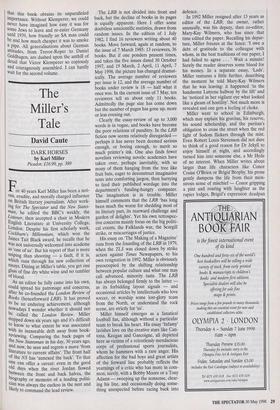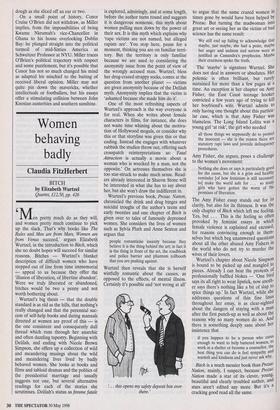The Miller's Tale
David Caute
DARK HORSES by Karl Miller Picador, i16.99, pp. 389 For 40 years Karl Miller has been a seri- °Its, erudite, and morally charged influence 9Il British literary journalism. After work- ing for The Spectator and the New States- man, he edited the BBC's weekly, the Listener, then accepted a chair in Modern English Literature at University College, London. Despite his first scholarly work, Cockbum's Millennium, which won the James Tait Black award, he recalls that he was not universally welcomed into academe as `one of us'. But his report of that is more sinning than shooting — a fault, if it is, which runs through his new collection of essays. Dining at Miller's table, you get one glass of fine dry white wine and no tumbler of blood.
As an editor he fully came into his own, could spread his patronage and concerns, after he co-founded the London Review of B°0Ics (henceforward LRB). It has proved to be an enduring achievement, although nowadays I wonder whether it should not be called the London Review. Miller stepped down six years ago and it's difficult to know to what extent he was associated with its inexorable drift away from book- reviewing. Comparing the back pages of the New Statesman in his day, 30 years ago, and now, he sees and regrets a move 'from literature to current affairs'. The front half of the NS has 'annexed the back'. To that one can offer a caveat: even in the good old days when the river Jordan flowed between the front and back halves, the biography or memoirs of a leading politi- cian was always the cuckoo in the nest and likely to command the lead review. The LRB is not divided into front and back, but the decline of books in its pages is equally apparent. Here I offer some doubtless unscientific statistics, drawn from random issues. In the edition of 1 July 1982, I find 16 reviewers writing about 40 books. Move forward, again at random, to the issue of 7 March 1985: 13 reviewers, 36 books. But if one ponders present times, and takes the five issues dated 30 October 1997, and 19 March, 2 April, 11 April, 7 May 1998, the picture has changed dramat- ically. The average number of reviewers per issue is 12, and the average number of books under review is 18 — half what it once was. In the current issue of 7 May, ten reviewers tell us about only 11 books. Admittedly the page size has come down but the number of pages has gone up, more or less evening out.
Clearly the essay-review of up to 3,000 words is in vogue, and books have become the poor relations of punditry. In the LRB fiction now seems relatively disregarded perhaps it has never been deemed serious enough, or boring enough, to merit so much printer's ink. One also finds fewer novelists reviewing novels: academics have taken over, perhaps inevitably, with so many of them hanging from the tree like fruit bats, eager to deconstruct imaginative texts into comforting jargon, then hurrying to feed their published wordage into the department's funding-hungry computer. The imagination is in trouble. Miller himself comments that the LRB 'has long been much the worse for shedding most of its literary part, its rearward challenge and garden of delights'. Yet his own retrospec- tive concerns mainly focus on the big politi- cal events, the Falklands war, the Scargill strike, or miscarriages of justice.
His essay on 'The Making of a Magazine' runs from the founding of the LRB in 1979, when the TLS was closed down by strike action against Times Newspapers, to his own resignation in 1992. Miller is obviously preoccupied by the shifting relationship between popular culture and what one may call advanced, minority taste. The LRB has always belonged firmly to the latter as its forbidding layout signals — and occasional articles by intellectuals who love soccer, or worship some lost-glory team from the North, or understand the rock scene, are strictly for 'us'.
Miller himself emerges as a fanatical football fan, although without a particular team to break his heart. His essay 'Infamy' lavishes love on the creative stars like Can- tona, Keegan and Gascoigne, all depicted here as victims of a relentlessly mendacious corps of professional sports journalists, whom he hammers with a rare anger. His affection for the bad boys and great artists of the forward line probably reflects the yearnings of a critic who has more in com- mon, surely, with a Bobby Moore or a Tony Adams — sweeping up the nonsense, clear- ing his line, and occasionally doing some- thing unexpected before racing back into defence.
In 1992 Miller resigned after 13 years as editor of the LRB; the owner, rather unusually, was his deputy, then co-editor, Mary-Kay Wilmers, who has since that time edited the paper. Recalling his depar- ture, Miller freezes at the fence: 'I owe a debt of gratitude to the colleague with whom, in the best traditions of our paper, I had failed to agree . . . ' Wait a minute! Surely the reader deserves some blood for his money. In a separate essay, 'Lads', Miller ventures a little further, describing the moment he told Mary-Kay Wilmers that he was leaving: it happened in the handsome Lutyens hallway by the lift' and he 'noticed in her vigilant eye what looked like a gleam of hostility'. Not much more is revealed and one gets a feeling of choke.
Miller went to school in Edinburgh, which may explain his gravitas, his reserve, his sound scholarship, and the puritan's obligation to cross the street when the red light of Sodom flickers through the mist. Even Robert Louis Stevenson did not dare to think of a good reason for Dr Jekyll to enjoy himself at night, and accordingly turned him into someone else, a Mr Hyde of no interest. When Miller writes about larger than life characters like Conor Cruise O'Brien or Brigid Brophy, his prose gently dampens the life from their mon- strous sense of mischief — Conor gripping a pint and roaring with laughter as the rapier lodges, Brigid's expression deadpan dough as she sliced off an ear or two.
On a small point of history, Conor Cruise O'Brien did not withdraw, as Miller implies, from the impossibilities of being Kwame Nkrumah's vice-Chancellor in Ghana to his house overlooking Dublin Bay: he plunged straight into the political turmoil of mid-Sixties America as Schweitzer Professor at NYU. Miller traces O'Brien's political trajectory with respect and some puzzlement, but it's possible that Conor has not so much changed his mind as adapted his mischief to the baiting of received liberal opinion. Miller may not quite pin down the mavericks, whether intellectuals or footballers, but his essays offer a stimulating collision between John Knoxian austerities and southern sunshine.



































































 Previous page
Previous page